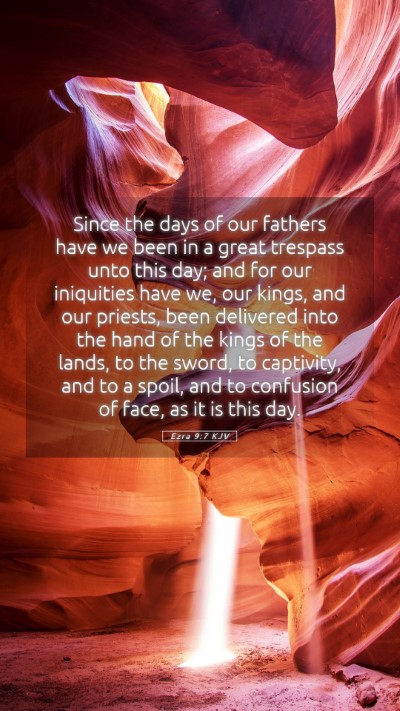Old Testament
Genesis Exodus Leviticus Numbers Deuteronomy Joshua Judges Ruth 1 Samuel 2 Samuel 1 Kings 2 Kings 1 Chronicles 2 Chronicles Ezra Nehemiah Esther Job Psalms Proverbs Ecclesiastes Song of Solomon Isaiah Jeremiah Lamentations Ezekiel Daniel Hosea Joel Amos Obadiah Jonah Micah Nahum Habakkuk Zephaniah Haggai Zechariah MalachiEzra 9:7 Meaning
What is the meaning of Ezra 9:7?
Since the days of our fathers have we been in a great trespass unto this day; and for our iniquities have we, our kings, and our priests, been delivered into the hand of the kings of the lands, to the sword, to captivity, and to a spoil, and to confusion of face, as it is this day.
Ezra 9:7 Bible Verse Meaning
Bible Verse Meaning: Ezra 9:7
Ezra 9:7 (KJV): "Since the days of our fathers have we been in a great trespass unto this day; and for our iniquities have we, our kings, and our priests, been delivered into the hand of the kings of the lands, to the sword, to captivity, and to a spoil, and to confusion of face, as it is this day."
Summary of Insights
This verse reflects Ezra's acknowledgment of the collective sin of Israel, emphasizing the continuous struggle and resulting consequences of their disobedience to God's commandments.
Contextual Background
The Book of Ezra is set during the time of the return from Babylonian exile. Ezra, a priest and scribe, leads a group of exiles back to Jerusalem to restore the law and worship. This verse is part of Ezra's confession after learning about the intermarriage between the Israelites and foreign peoples, which was against God's commands.
Insights from Commentaries
Matthew Henry's Commentary
Matthew Henry elaborates that Ezra's words reflect the deep-rooted nature of Israel's sin, which dates back to the times of their ancestors. This demonstrates the longstanding nature of their transgressions and their consequences. He emphasizes that national sin leads to national calamity and that confession is essential for healing and restoration.
Albert Barnes' Notes
Albert Barnes interprets this verse as an appeal to the recognition of sin’s serious implications. He notes that the "great trespass" signifies a betrayal of their covenant with God, leading to divine punishment, which includes captivity and shame. Barnes stresses the importance of acknowledging and repenting for past wrongs to seek restoration and favor from God.
Adam Clarke's Commentary
Adam Clarke offers a glimpse into the historical ramifications of Israel's disobedience. He explains that their conduct has brought them to a state of disgrace and ruin, with leaders and people alike bearing the consequences of their actions. Clarke highlights that the mention of captivity and confusion of face indicates a profound loss of identity and purpose due to sin.
Theological Implications
Ezra 9:7 emphasizes several key theological concepts:
- Corporate Responsibility: The verse shows that sin affects not only individuals but the entire community, calling for collective acknowledgment and repentance.
- Historical Continuity of Sin: Ezra connects present struggles to historical disobedience, underlining the ongoing need for faithfulness to God's covenant.
- Importance of Confession: The necessity of confession and repentance is highlighted as a precursor to restoration and reconciliation with God.
Application to Daily Life
This verse serves as a reminder of the importance of self-examination and accountability within communities. For modern readers, whether in bible study groups or during online bible study sessions, Ezra 9:7 prompts discussions on the impact of shared values and practices on collective spiritual health.
Cross References
- Psalm 106:6-7 - A confession of national sin and recounting the history of disobedience.
- Nehemiah 1:6-7 - Nehemiah's prayer of confession on behalf of the people.
- Daniel 9:8-10 - Daniel's acknowledgment of Israel's sin and plea for mercy.
Conclusion
Ezra 9:7 offers profound insights into the nature of sin, communal responsibility, and the essential need for confession. It serves as a poignant reminder for contemporary believers to reflect on their collective faith journey and the importance of aligning with God's purposes.


